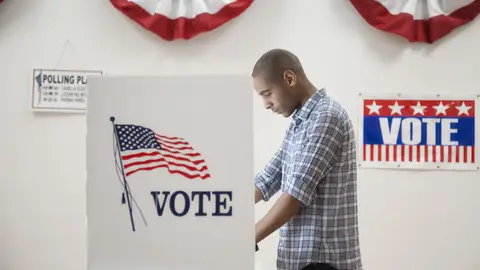Any Democratic Frontrunner Could Beat Trump if All Unregistered LGBTQ People Voted in 2020

Look to your left. Look to your right. If one of your LGBTQ friends is not registered to vote, now might be the time to have that conversation.
On Monday, The New York Times and Siena College released a stunning poll that suggests former Vice President Joe Biden is the only Democratic presidential hopeful who can carry key swing states in the race to defeat Trump.
The poll, which surveyed 3,766 registered voters, found that Elizabeth Warren and Bernie Sanders are trailing Trump among likely voters in Michigan, Pennsylvania, Wisconsin, Florida, Arizona, and North Carolina.
Only Joe Biden has the backing to carry to those critical states that determined the 2016 presidential race, according to the report.
For LGBTQ voters backing Warren or Sanders because of their support for Medicare for All, or because they have released LGBTQ platforms (Biden hasn’t released one yet), the prospect of just one viable Democrat contender might seem scary. It’s worth noting that the poll only looks at Warren, Sanders, and Biden, skipping other top contenders—including openly gay Indiana politician Pete Buttigieg, who is polling above Biden in Iowa.
Nate Cohn, who conducted the electability poll, told the The New York Times podcast The Daily that his team was inspired to conduct the poll because Democrats are obsessed with beating Trump in 2020.
“They say that they would rather vote for a candidate who had the best chance to beat President Trump, even more so than someone who they agree with most on the issues,” Cohn added.
As sobering as Cohn’s numbers may seem for Warren and Sanders fans, they should serve as a wake-up call to LGBTQ political advocates. Last month, the Williams Institute at UCLA reported that more than one in five LGBTQ people (21%) wasn’t registered to vote. LGBTQ voters make up a powerful voting block across the nation; 9 million are registered and eligible to vote in the 2020 election.
A NewNowNext analysis finds that if every eligible unregistered queer voter got to the polls in 2020, Democratic presidential hopefuls would overtake Trump in some of those key battleground states.
In Wisconsin, Sanders is locked in a dead heat with Trump, while Warren trails him by two points. If that state’s estimated 46,392 unregistered LGBTQ voters made it to the polls, Sanders would win the state, while Warren would be just shy of a victory. That’s because those new voters would represent a 1.5% increase in registered voters. (Notably, those estimates don’t even account for all of the 6,600 transgender people who the Williams Institute estimates are disenfranchised due to strict voter ID laws in Wisconsin.)
Low numbers of LGBTQ voters are expected to turn out for Trump. The Williams Institute reports that just 15% of LGBTQ voters are registered Republicans, while 50% are Democrats and 35% are independent or unknown.
Sen. Elizabeth Warren.
A recent Pew Research Center report found that independents are slightly more likely to lean Democratic (17%) than Republican (13%). The same report finds that independent voters overwhelmingly support LGBTQ equality, even among Republican-leaning independents.
Christy Mallory, who led the Williams Institute’s voter study, warns that little research has been done that drills into state-by-state trends among queer voters. Even less is known about what might motivate them to register to vote.
“And, of course, [being] registered to vote is different than actually voting,” Mallory tells NewNowNext. “We don't have those numbers for LGBTQ people.”
Still, any Democratic presidential hopeful serious about winning should not just be trying to energize LGBTQ voters, but pushing to get them to the polls, no matter their party.
“Nine million people across the country is a big number,” Mallory says. “And [LGBTQ people] are slightly less likely to be registered to vote.”
Sen. Bernie Sanders.
In Arizona, a push to register LGBTQ voters could mean a win for Warren, who is neck-and-neck with Trump (Sanders trails Trump by 4% there), according to The Times. NewNowNext finds that that state’s 67,772 unregistered voters would boost the electorate there by a staggering 2.1%.
In prized Florida with its 29 electoral votes, Trump is besting Sanders and Warren at two and four points respectively, The Times found. That state’s estimated 205,751 unregistered LGBTQ voters would comprise a 2.2% bump in the voting population there.
In North Carolina—which The Times predicts not even Biden can win (he’s currently down by two points)—a massive LGBTQ registration drive could put as many as 1.7% more new voters on the books. That’s not enough to constitute a win for Warren or Sanders, who are both down by 4% there, but it certainly doesn’t hurt.
A breakdown of NewNowNext's analysis, including data from the Williams Institute, U.S. census population estimates from 2018, and census estimates of registered voters from 2018.
No matter who your candidate or your party affiliation, you can find out how to register at Vote.gov.
An earlier version of this story stated that Christy Mallory said that LGBT people were more likely to be registered. The Williams Institute found they were less likely to be registered.





